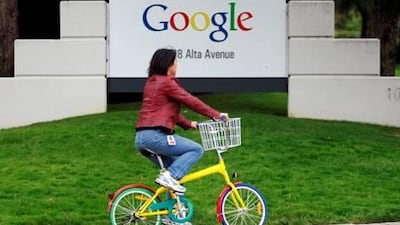In his first day back in the driving seat at Google, Larry Page spent almost US$1 billion (Dh3.67bn) on an acquisition and began to prepare to take on new rivals such as Facebook in earnest.
In a move that is already being compared with Steve Jobs's historic return to Apple in 1997, Larry Page is once again running the company he co-founded while still at college with Sergey Brin. He has taken over from Eric Schmidt in the role of chief executive.
But whereas Apple was seen as a failing company when Mr Jobs returned to take the helm after a 12-year absence, Mr Page is regaining control of Google when the company appears still to be at its height. Generally regarded as a juggernaut, if not a near monopoly, Google has seen its shares rise from $85 at its initial public offering in 2004 to about $577 today. The word Google has even entered some dictionaries as a verb.
Mr Jobs had little to lose and a great deal to gain by turning Apple around. Mr Page, on the other hand, may find his challenge is to retain market share in an industry that is evolving fast around him. No longer the bright new kid in town, Google is increasingly worried by newer internet players such as Facebook.
According to In the Plex: How Google Thinks, Works and Shapes Our Lives, a book due out this month, Google is running scared of the social networking giant Facebook.
The book's author, Steven Levy, reports that the fight against Facebook started to escalate last year when Urs Hoelzle, Google's first engineering vice president, warned the company was behind in social networking and needed to recruit people to work on that aspect of the business immediately.
The new book says Google named the project Emerald Sea, after an 1878 painting showing a wave knocking over a ship. Google executives are said to have warned their staff that the search engine company would either ride the social-networking wave or be drowned by it.
Unfortunately, Google's own social-networking site, Buzz, enraged users by adding their contacts from the Google e-mail service, Gmail, without their express permission. As a result, the US federal trade commission has barred Google from future "privacy misrepresentations" and ordered the search engine company to roll out a privacy programme.
Google was also the focus of consumer outrage when it emerged the company had been using "mapping" vans driving through neighbourhoods hacked into private Wi-Fi connections gaining customer information.
During his time as chief executive, Mr Schmidt also managed to offend privacy groups by declaring: "If you have something that you don't want anyone to know, maybe you shouldn't be doing it in the first place." Mr Schmidt also said Google was prepared to make all the information held on its customers available to the authorities.
But In the Plex alleges Mr Schmidt took a very different view where access to his own private data was concerned. Levy alleges he tried to make Google remove from its search engine information relating to a political donation he had made. The former Google executive Sheryl Sandberg, now Facebook's chief operating officer, is alleged to have told Mr Schmidt it would be unacceptable for Google to do that.
Larry Page's immediate task is twofold. He must repair Google's tarnished public image while keeping pace with Facebook.
In the longer term, his other challenges include ensuring Google can also ride the tide of new technologies such as smartphone communications, electronic publishing, cloud computing for business and on-demand internet video. In these new markets, Google must also take on rivals as varied as Apple and pirate video sites.
Mr Page has begun his new role by spending $900 million on Nortel Networks patents as a safeguard against patent litigation. Given that Google is only 14 years old, its patent portfolio does not match those of more mature technology companies such as Microsoft and IBM.
Mike Davis, an analyst at the research company Ovum, hails the replacement of Mr Schmidt with Mr Page as "a sassy strategic move".
"Google knows it cannot live on search-derived advertising revenues forever, hence its continual release of 'Beta' products and push towards both the smartphone and enterprise markets," Mr Davis said. "Such innovation needs a dynamic lead and the shareholders need a steady voice. The new arrangement should satisfy those requirements."
But Mr Page has a testing time ahead if he is not to go down in business history as the man who led Google into a period of decline.

